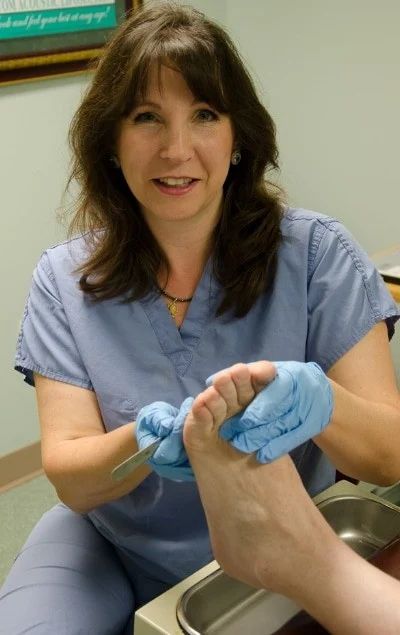
Foot Doctor – Podiatrist Training

I am a podiatrist. However, I recognize that its complete range of meaning is not clear to everyone, including some of my patients. This realization has struck me many times, as I’ve chatted with regular patients about what has happened in their lives since their last appointments. On several occasions, I have been surprised to learn that someone had seen another doctor for a lower extremity treatment, unaware that I , a Foot Doctor, perform the same procedure.
Therefore, I would like to detail my qualifications and acquaint you with the full spectrum of my capabilities. While earning my four-year university degree, a necessity for all aspiring podiatrists, I strove to exceed all of the standard premed requirements.
Fortunately, I was accepted to the Ohio College of Podiatric Medicine. During the first two years, the courses, in the basic sciences, pharmacology, anatomy, physiology, and the cadaver lab, were nearly identical to those taught in a medical school. We had classes in the morning, and clinical rotations in the afternoon. Our subjects included surgery, general medicine, orthopedics, sports medicine, radiology, and dermatology, all with emphasis on the lower extremities. In one of my favorite classes, Pod Med, which we fondly called “arts and crafts,” we learned the techniques of casting, splinting, and padding. After graduating, I took the comprehensive, all-day state licensing exam, which is required to become a podiatrist.
However, because I also wanted to be a surgeon, and achieve board certification, it was compulsory for me to receive advanced training in a four-year residency program, which I completed at The Medical Center, in Beaver. During that time, I performed more than 500 surgical procedures, while working rotations through the hospital in plastic surgery, general surgery, dermatology, vascular surgery, orthopedic surgery, the lab, and the emergency room.
As is standard for all podiatrists, I practiced for several years before becoming eligible for board certification. This process entails several, grueling days of written and oral exams, and a review of 100 of my surgical cases, 25 of which are randomly chosen by a board of surgeons, who pore over them for months. This is what it means to be a board-certified physician, the only kind I recommend when selecting any type of doctor. It also means that a board-certified podiatrist is the most qualified professional to care for your lower extremities.
What questions should you ask a foot doctor?
When visiting a foot doctor, also known as a podiatrist, it’s essential to ask relevant questions to gain a better understanding of your foot health and any potential issues you may be experiencing. Here are some questions you can consider asking your foot doctor:
- What is the cause of my foot pain or discomfort?
- What are the treatment options for my specific foot condition?
- Are there any lifestyle changes I should make to improve foot health?
- Can you explain the diagnosis and prognosis of my foot condition in simple terms?
- What can I do to prevent future foot problems?
- Should I modify my footwear or use orthotics to support my feet?
- Are there any exercises or stretches that can benefit my foot health?
- How long is the expected recovery time for my foot condition?
- Are there any potential complications associated with my foot treatment?
- What steps can I take to manage pain and discomfort in the meantime?
- Should I avoid any specific activities while recovering?
- Are there any warning signs I should look out for that indicate my condition is worsening?
- What can I do to minimize the risk of foot injuries during physical activities or sports?
- How often should I come for follow-up appointments or routine foot check-ups?
- Are there any medical or health conditions that may be contributing to my foot problems?
- Can you provide information about proper foot care and hygiene?
- Is there a recommended foot care routine I should follow at home?
- Are there any over-the-counter medications or remedies that may help with my foot condition?
- Do I need any imaging or additional tests to further assess my foot condition?
- What are the potential long-term implications of my foot condition, and how can it be managed in the future?
Foot Doctor
I am licensed in Pennsylvania to treat soft tissue below the knee, and bones from the ankle, down. Among other things, I provide diabetic and geriatric foot and nail care, cutting and treatment of thick nails, removal of ingrown toenails and warts, treatment and removal of ganglion cysts, fibromas, and lipomas, and the removal of foreign objects, such as glass and splinters. I also treat ankle sprains, broken bones, stress fractures, tendonitis, hammertoes, and bunions. In addition, I specialize in diabetic wound care, especially nonhealing ulcers of all types, including venous stasis and pressure ulcers.
I have advanced training in treating heel spurs, and am certified to perform extracorporeal shockwave therapy for plantar fasciitis. With the only local, in-office diagnostic ultrasound machine, I can also perform Doppler vascular exams, and take foot and ankle X-rays. Call me, Dr. Christina Teimouri, DPM at Beaver Valley Foot Clinic at 724-772-FOOT (3668), or visit www.bvfootclinic.com for the help you need.
READY TO SCHEDULE AN APPOINTMENT?
Call us today 878-313-3338 to schedule at any of our four Podiatry Clinics in Beaver, Butler, or Allegheny County locations, including Podiatry offices Moon Township, Ambridge, Cranberry Township’s full service Podiatric office and our newest Foot Clinic, Beaver, PA
